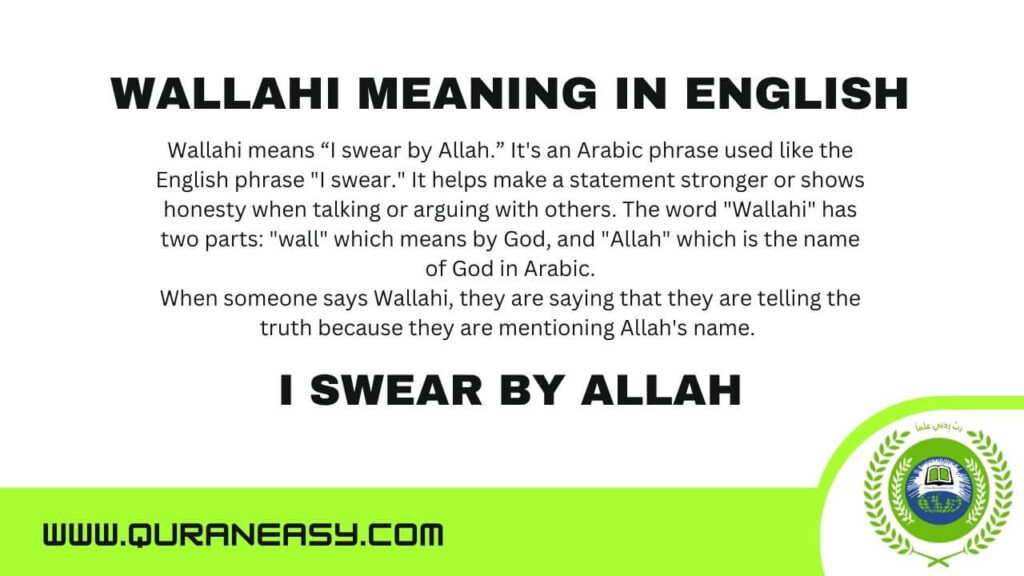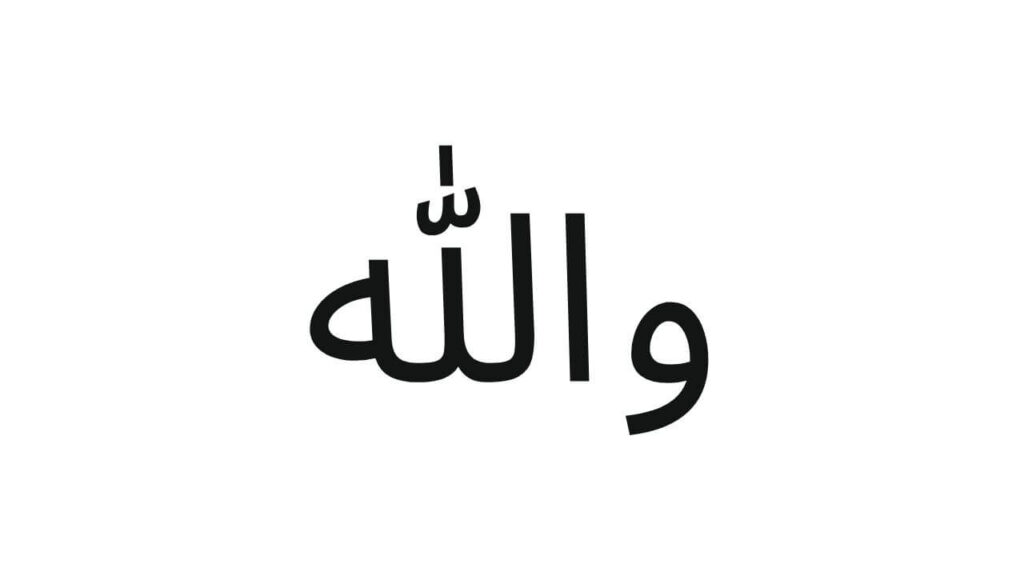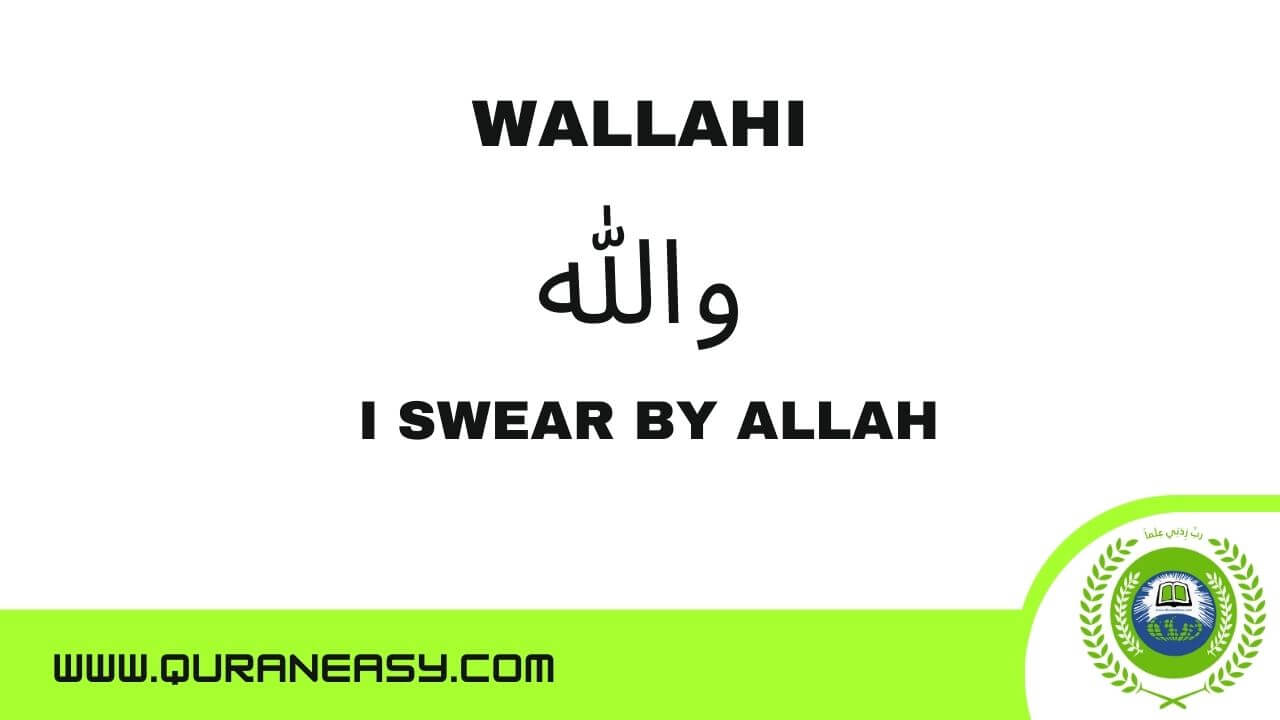Islam is a comprehensive religion, guiding its adherents in every aspect of life. One such aspect is the use of oaths to affirm the truth or make promises, which is where the phrase “Wallahi” comes into play.
This Arabic phrase literally translates to “I swear by Allah” and holds significant weight in Islamic tradition.
Many individuals tend to use oaths for even minor reasons, despite the guidance from Allah to “guard your oaths,” essentially urging believers to refrain from swearing excessively. Oaths, in essence, are a means to glorify Allah.
In the Holy Quran, Allah SWT advises,
“And do not make [your oath by] Allah an excuse against being righteous and fearing Allah and making peace among people. And Allah is Hearing and Knowing”.
The cherished teachings of our revered Prophet Muhammed (PBUH) serve as a guiding light on how to conduct ourselves, communicate, celebrate, and much more.
Similarly, the phrase Wallahi, derived from the Qur’an and Sunnah, finds its place in our daily interactions. This article aims to assist you in comprehending and assimilating the essence of this Islamic phrase in your everyday life.
In this article, I will share Wallahi meaning, its origins, use in daily life, and its mention in Islam.
Wallahi Meaning In English

Wallahi means “I swear by Allah.” It’s an Arabic phrase used like the English phrase “I swear.” It helps make a statement stronger or shows honesty when talking or arguing with others. The word “Wallahi” has two parts: “wall” which means by God, and “Allah” which is the name of God in Arabic.
Wallahi is an Islamic way to say “I swear by Allah” when people are talking. When someone says Wallahi, they are saying that they are telling the truth because they are mentioning Allah’s name.
It’s a way to show that they really mean what they are saying. It’s like making a promise while mentioning Allah’s name, which is very important for Muslims.
Our Prophet Peace Be Upon Him says:
“He who has to take an oath, he must not take oath but by Allah. The Quraish used to take oath by their fathers. So he (the Holy Prophet) said: Do not take oath by your fathers”.
Wallahi Pronunciation
The pronunciation of Wallahi is (Wal-lahi), and in Arabic, it is written as والله. Other similar expressions like Tallahi and Billahi, also used by the Prophet Muhammad (Peace Be Upon Him), share the same meaning as Wallahi. These expressions serve as a reminder of the divine presence and the importance of truthfulness, which is a core value in Islam.
Wallahi In Arabic

Wallahi is written in Arabic as والله. It’s used to swear by Allah or make a promise. Similar expressions like Tallahi and Billahi were also used by the Prophet PBUH, conveying the same meaning as Wallahi. The phrase Mashallah Wallahi is an expression of admiration or appreciation towards something.
Mashallah Wallahi
“Mashallah Wallahi” is used to express admiration or appreciation for something or someone. While Mashallah is a term used to appreciate the beauty or goodness of something, attributing it to God’s will, combining it with Wallahi further emphasizes the speaker’s sincere admiration by swearing by Allah’s name.
Wallahi Al Azeem
Wallahi Al Azeem translates to “I swear by Allah, the Almighty.” Here, Al Azeem, one of the 99 beautiful names of Allah, means the Magnificent or the Great One. Wallahi Al Azeem is used to make a more emphatic oath, attributing the statement to the grandeur and magnificence of Allah.
Wallah Wbillahi Wtallahi
Wallah, Wbillahi, Wtallahi are islamic ways to swear by Allah in Arabic. The Arabic letters Waaw, Baa’a, Taa’a are used when making a swear or promise. So, when someone says Wallaahi, Billaahi, or Tallaahi, they are swearing by Allah or making a promise by Allah.
When To Say Wallahi? Do’s And Don’ts
Saying Wallahi has some rules based on religion. Here are some things to know when you think about swearing by Allah’s name:
- The person saying Wallahi should be able to think clearly and be grown-up.
- You should only swear about things that are not bad or frowned upon (Makrooh).
- When you swear, you should use Allah’s name or talk about one of His qualities.
- Only swear about things that can actually happen or are real.
- It’s really important to only use Allah’s name when swearing, not the names of prophets, your parents, or anything else.
Prophet Muhammad (PBUH) made it clear, saying,
“If you’re going to swear, only swear by Allah or don’t say anything at all.”
These rules help make sure that when you say Wallahi, it’s done in the right way. It’s not something to say lightly or about silly things.
It’s a serious promise you are making, and by saying Allah’s name, you are reminding yourself and others about the importance of what you are saying. It’s a way to show respect to Allah and to the people you are talking to.
Oaths You Shouldn’t Make
- Don’t swear by anything other than Allah like a holy book, your life, or the Prophet, etc.
- Don’t make a promise that goes against what Allah or the Prophet (PBUH) says, or say you would change your religion based on certain actions.
- Don’t swear by your parents or by things that aren’t true, like false gods or leaders.
Swearing using Allah’s Qualities
You can make a promise using Allah’s name like saying “By Allah” or “I swear by Allah” or even by mentioning one of Allah’s qualities like saying, “I swear by His greatness.”
Saying Swear Words Without Really Meaning It
Sometimes people might say, “No, by Allah” or “Yes, by Allah” without really meaning to swear. This is considered as just talk, and Allah says He won’t hold you responsible for such slips.
There’s no need to make up for these words as they are not considered a real oath, and you don’t commit a sin by saying them.
Serious Oaths and Their Rules
When you really mean to make a promise and are sure to do it, that’s a serious oath. If you break this kind of oath, you need to make up for it.
The Prophet (PBUH) said,
Who takes an oath but later sees that it is better to do something else should break the oath and pay an expiation.
Is a Promise Different from a Oath or Vow?
There are three kinds of oaths:
- The Engulfing Oath: When you swear that something did or didn’t happen in the past, but you are lying. This is a big wrongdoing, and there’s no way to make up for it.
- The Enacted Oath: When you swear to do or not to do something in the future. If you break this kind of oath, you need to do something to make up for it.
- The Mistaken Oath: When you swear about something in the past, but you got it wrong. There’s no way to make up for this type of oath since it was a mistake.
Promises
A promise is just saying that you will do or won’t do something in the future. If you break a promise, you don’t have to do anything to make up for it.
Vows
A vow is when you say out loud that if something happens, you’ll do something good like praying, fasting, or giving to charity.
If you break a vow, you should feed or clothe ten poor people, or give them money. If you can’t do that, then you should fast for three days in a row to make up for it.
Benefits of Saying Wallahi
In the Arabic language, when someone says Wallahi, they are making a serious promise by swearing by Allah, the Almighty. This is a special promise made by Muslims to show that they are telling the truth or will keep their promise. Saying Wallahi has many good effects on both a person and the people around them.
Building Trust
When you say Wallahi, it helps build trust between people. Muslims believe that when they swear by Allah’s name, it shows they are serious and honest. This promise tells others that they mean what they say and will do what they promise. This helps in making dealings with others honest and fair.
Creating a Truthful Society
Wallahi can help create a culture where people are honest and reliable. When Muslims swear by Allah, they are using His name to show that they are telling the truth. Parents can teach their kids to use Wallahi when they are serious, helping to build a culture where people tell the truth and do the right thing.
Solving Disputes
Wallahi can be used to solve problems among Muslims. In a community where arguments happen, using Wallahi can help sort things out. By swearing by Allah’s name, people can show they are truthful, find a solution, and fix the problem peacefully without fighting.
Taking Responsibility
Saying Wallahi helps people remember that Allah is watching over what they do. When they make a promise using Wallahi, it reminds them that Allah is a witness to their promise. This helps people to keep their promises, be honest, and live in a way that is closer to what Allah wants.
Spiritual Benefits
Like other practices in Islam, saying Wallahi has spiritual benefits too. It helps to make faith stronger and reminds people that Allah is always there, watching. Wallahi can also be a way to ask Allah for forgiveness. When you swear by Allah’s name, muslims show their strong connection with Allah and ask for forgiveness for any mistakes.
Conclusion
Wallahi is a simple phrase but it has a deep meaning in Islam. It shows respect for Allah and tells others that you are being honest. When people use Wallahi in the right way, it helps in making personal connections stronger and also shows the important values of truth and honesty in Islam.
When you understand what Wallahi really means and when to use it, you can see how it helps in making a community better, just like how Islam teaches us to live in a good and peaceful way.





Leave A Comment